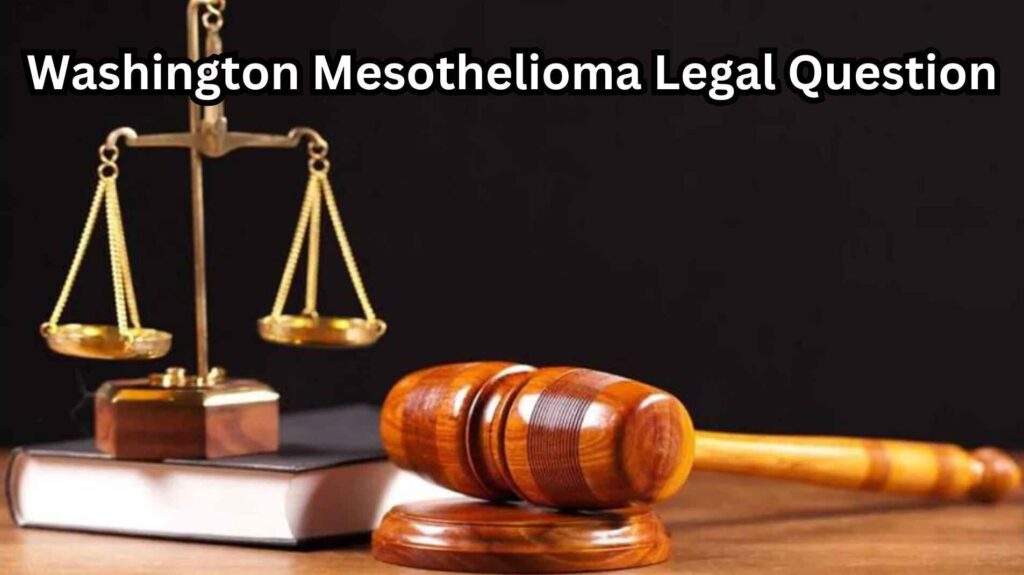Navigating the legal landscape after a mesothelioma diagnosis in Washington can be challenging. Understanding the state’s specific laws and procedures is crucial for securing justice and compensation.
“Washington Mesothelioma Legal” refers to the various legal issues, such as filing claims and exploring compensation options, that individuals with mesothelioma may face.
This guide provides a clear overview of these legal challenges, offering insights into the steps involved to help you effectively manage your case. By understanding your rights and the available legal options, you can better navigate this difficult path toward justice.
Overview of Washington Mesothelioma Legal Question
When we talk about the Washington mesothelioma legal question, we’re diving into a world of complex legal issues unique to the Evergreen State. Washington’s industrial history, particularly in shipbuilding and manufacturing, has unfortunately left a legacy of asbestos exposure.
This has led to a higher-than-average rate of mesothelioma cases, making the legal landscape here particularly important. Understanding this legal framework is crucial for victims seeking justice and compensation. From state regulations to liability claims, each aspect plays a vital role in shaping how mesothelioma cases are handled in Washington courts.
Common Legal Issues in Washington Mesothelioma Legal Question
The legal issues surrounding Washington mesothelioma cases are as varied as they are complex. One of the biggest hurdles? Identifying the parties responsible for asbestos exposure. This can be tricky, especially when dealing with exposure that happened decades ago.
Companies may have gone bankrupt, changed names, or been acquired by others. Then there’s the challenge of proving causation – linking a specific asbestos exposure to the development of mesothelioma.
This often requires extensive research into work histories and industrial practices. Add to this the possibility of dealing with multiple defendants, and you’ve got a legal tangle that would make even Sherlock Holmes scratch his head.
How to File a Claim: Washington Mesothelioma Legal Question
Filing a mesothelioma claim in Washington isn’t like filling out a simple form – it’s more like embarking on a legal odyssey. The process starts with gathering crucial documentation: medical records confirming your diagnosis, employment history detailing potential asbestos exposure, and any other evidence linking your illness to asbestos.
Next, you’ll need to identify the appropriate court to file your claim. This could be a state court in Washington or, in some cases, a federal court. Timing is critical here – filing too late could mean losing your right to compensation due to the statute of limitations.
It’s a complex process, but don’t let that deter you. With the right guidance, you can navigate these legal waters and seek the justice you deserve.
See Also : Independence Asbestos Legal Question: A Comprehensive Guide
Eligibility Criteria for Washington Mesothelioma Legal Question

When it comes to the Washington mesothelioma legal question, not all cases are created equal. To be eligible for a claim, you’ll need to meet specific criteria. First and foremost, you must have a confirmed diagnosis of mesothelioma.
This typically involves a biopsy and pathology report from a qualified medical professional. Next, you’ll need to demonstrate a history of asbestos exposure in Washington state. This could be through work history, residential history, or even secondary exposure (for example, if you lived with someone who worked with asbestos).
The tricky part? This exposure often happened decades ago, making documentation crucial. Residency and employment factors also play a role – while you don’t necessarily need to be a current Washington resident, your case should have a significant connection to the state.
Types of Compensation Available in Washington Mesothelioma Legal Question
When it comes to compensation claims in Washington mesothelioma cases, there’s more than one way to seek justice. The types of compensation available can be broadly categorized into economic, non-economic, and punitive damages. Economic damages cover tangible losses like medical expenses and lost wages.
This could include past and future medical treatments, travel costs for medical care, and even lost earning capacity. Non-economic damages, on the other hand, compensate for intangible losses like pain and suffering, loss of enjoyment of life, and emotional distress.
These can be substantial in mesothelioma cases, given the severe impact of the disease on quality of life. In some cases, punitive damages may also be awarded. These are meant to punish particularly egregious conduct by defendants and deter similar behavior in the future.
How to Choose a Lawyer for Washington Mesothelioma Legal Question
Choosing the right lawyer for your Washington mesothelioma legal case is like picking a guide for a treacherous mountain climb – you want someone with experience, skill, and a track record of success. Look for attorneys who specialize in asbestos litigation, particularly those with experience in Washington state courts.
They should have a deep understanding of state regulations and the nuances of liability claims in mesothelioma cases. Don’t be shy about asking potential lawyers about their success rates, their approach to case evaluation, and how they handle client communication. Also, inquire about their fee structure – most reputable mesothelioma attorneys work on a contingency basis, meaning they only get paid if you win your case.
Statute of Limitations for Washington Mesothelioma Legal Question
In the world of Washington mesothelioma legal cases, the statute of limitations is like a ticking clock that can make or break your case. In Washington, you generally have three years from the date of diagnosis to file a personal injury claim for mesothelioma.
For wrongful death cases, the clock starts ticking from the date of death. However, it’s not always that straightforward. Washington applies a “discovery rule,” which means the clock starts when you knew or should have known that your illness was caused by asbestos exposure.
This can be tricky to determine and often requires legal interpretation. There are also some exceptions and special circumstances that can affect these time restrictions. For instance, if the victim was a minor at the time of exposure, the rules might be different.
Gathering Evidence for Washington Mesothelioma Legal Question
Building a strong case for a Washington mesothelioma legal claim is like putting together a complex puzzle – every piece of evidence counts. The cornerstone of your case will be your medical records, which should clearly document your mesothelioma diagnosis.
But that’s just the beginning. You’ll need to compile a detailed employment history, focusing on jobs where you might have been exposed to asbestos. This could include shipyards, construction sites, factories, or even offices in older buildings. Exposure documentation is crucial – think work orders, building records, or testimony from coworkers.
Personal records can also be valuable, such as diaries or calendars that might corroborate your work history. Don’t forget about evidence gathering related to the impact of your illness – medical bills, records of lost wages, and even personal accounts of how mesothelioma has affected your daily life can strengthen your claim.
See Also: Lebanon Mesothelioma Legal Question: A Comprehensive Guide
Understanding Settlement Options in Washington Mesothelioma Legal Question
When it comes to resolving your Washington mesothelioma legal case, settlement is often the end game. But it’s not a one-size-fits-all process. Settlements in mesothelioma cases can take various forms, each with its own pros and cons. A lump-sum settlement provides immediate financial relief, which can be crucial for covering medical expenses and securing your family’s future.
On the other hand, structured settlements offer regular payments over time, which can provide long-term financial stability. The negotiation process for settlements can be complex, involving back-and-forth between your lawyer and the defendants’ representatives.
Factors that influence settlement amounts include the strength of your evidence, the severity of your illness, and the financial resources of the defendants. It’s important to remember that settling means avoiding the uncertainty of a trial, but it also typically means accepting less than you might potentially win in court.
Appealing a Decision in Washington Mesothelioma Legal Question
Sometimes, the initial outcome of a Washington mesothelioma legal case isn’t the end of the road. If you receive an unfavorable decision, you may have the option to appeal. The appeal process involves asking a higher court to review the decision of the lower court.
Grounds for appeal might include legal errors made during the trial, improper admission or exclusion of evidence, or jury misconduct. It’s important to note that appeals are not retrials – the appellate court won’t consider new evidence. Instead, they review the proceedings of the lower court to ensure the law was applied correctly.
The timeline for filing an appeal in Washington is strict, typically 30 days from the entry of judgment. This underscores the importance of acting quickly and having experienced legal representation to navigate this complex process.
Common Challenges in Washington Mesothelioma Legal Question Cases
Navigating a Washington mesothelioma legal case can feel like running an obstacle course. One common challenge is dealing with bankrupt defendants. Many companies responsible for asbestos exposure have filed for bankruptcy, which can complicate the process of seeking compensation.
Another hurdle is overcoming statute of limitations issues, especially when the exposure occurred decades ago. Proving specific causation – that is, linking your particular case of mesothelioma to a specific instance or period of asbestos exposure – can also be tricky, given Washington’s diverse industrial landscape.
Defense strategies employed by defendants can be aggressive, often attempting to shift blame or minimize their liability. Additionally, the long latency period of mesothelioma means that evidence gathering can be challenging, as records may have been lost or witnesses may no longer be available.
How to Prepare for a Washington Mesothelioma Legal Question Case
Preparing for a Washington mesothelioma legal case is like gearing up for a marathon – it requires careful planning and endurance. Start by gathering all relevant personal and medical records. This includes not just your mesothelioma diagnosis, but your entire medical history. Next, work on documenting your asbestos exposure history in Washington.
This might involve creating a timeline of your work history, researching the companies you worked for, and reaching out to former colleagues who might serve as witnesses. Be prepared for depositions, which are formal interviews under oath.
Your lawyer will help you prepare for these, but it’s important to be honest and consistent in your responses. If your case goes to trial, you may need to testify in court. Again, your lawyer will guide you through this process, helping you understand what to expect and how to present your story effectively.
Impact of Washington State Laws on Mesothelioma Legal Question

The landscape of Washington mesothelioma legal cases is shaped by a unique set of state regulations and laws. Washington has some of the most comprehensive asbestos regulations in the country, which can impact how liability is determined in mesothelioma cases.
For instance, Washington’s product liability laws can make it easier to hold manufacturers responsible for asbestos-containing products. The state also has specific rules about how asbestos cases are handled in court, including special provisions for expediting cases where the plaintiff is gravely ill.
Understanding these state-specific regulations is crucial for building a strong case. It’s also worth noting how Washington’s laws compare to those of neighboring states. For example, Washington’s lack of strict damage caps can potentially lead to higher compensation in some cases compared to states with more restrictive laws.
Recent Developments in Washington Mesothelioma Legal Question
The world of Washington mesothelioma legal cases is constantly evolving, with new court decisions, legislative changes, and emerging trends shaping the landscape. Recent years have seen several significant developments. For instance, there have been court rulings expanding the scope of liability for some defendants, potentially opening up new avenues for compensation.
On the legislative front, there have been ongoing discussions about strengthening asbestos reporting requirements and enhancing penalties for violations of asbestos regulations.
Another trend to watch is the increasing use of technology in asbestos litigation, from digital record-keeping to virtual court proceedings. These changes can impact everything from how evidence is presented to how cases are tried.
Conclusion
Navigating the legal landscape for mesothelioma cases in Washington is complex, but understanding your rights and options is essential. From filing claims to seeking compensation and choosing the right lawyer, each step requires careful consideration and expert guidance.
Staying informed about state laws, recent developments, and the nuances of mesothelioma litigation can make a significant difference in your case’s outcome.
While the journey may be challenging, being prepared and knowing your legal rights can help you secure justice and the compensation you deserve for the hardships you have endured.
FAQ’s
How do I know if I have a valid mesothelioma claim in Washington?
You need a confirmed mesothelioma diagnosis, evidence of asbestos exposure in Washington, and to file within the statute of limitations.
What are the common legal issues associated with the Washington Mesothelioma Legal Question?
Common issues include identifying responsible parties, proving exposure, and handling cases involving bankrupt companies.
How do I choose the right lawyer for a Washington Mesothelioma Legal Question?
Select a lawyer experienced in asbestos litigation and familiar with Washington’s specific laws and court procedures.
What is the statute of limitations for filing a mesothelioma claim in Washington?
The statute of limitations is generally three years from the diagnosis or discovery of the disease.


